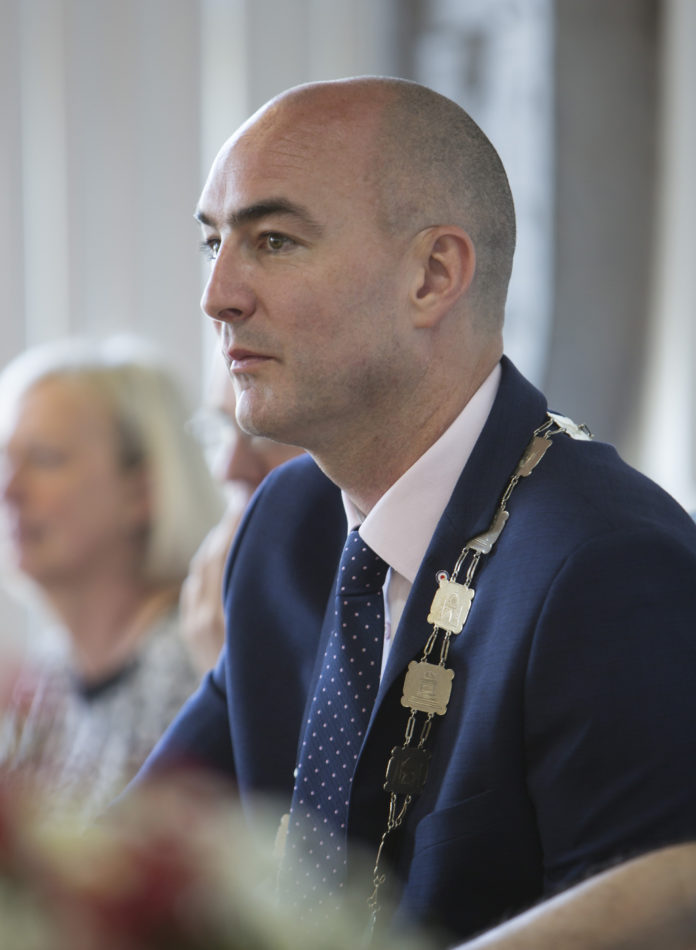
WHEN Limerick Metropolitan Mayor Daniel Butler said he hoped to continue to challenge the stigma of mental health, he was determined to move the conversation “in a meaningful way.”
With a background working in rehab and youth mental health group Jigsaw, along with his current role as a Drugs Education and Prevention worker in Limerick City, mental health is an issue that’s very important to the Raheen man.
For Limerick Mental Health Week he said his key message is that “health is everybody’s responsibility and any form of health, including mental health, is our responsibility.”
“It’s your responsibility to me and my responsibility to you.”
“It’s getting that message out that we have to take responsibility for mental health, all of us collectively, or nothing changes. It can’t just be handed over to the HSE or to mental health organisations.”
In particular, there is a focus on male mental health this week, with recent provisional findings from the Central Statistics Office (CSO) revealing that eight out of ten people who died by suicide last year were male.
The highest rate of suicide was among men ages 45 to 54.
Mayor Butler believes there’s a variety of reasons why this age group in particular are affected by suicide and poor mental health.
“First of all, there’s a generation gap. Younger people have more awareness around mental health. That generation that you’re talking about, 45 and up, had very little exposure to it.”
“The second aspect which I’d notice especially in my day job, is separating from partners and not having access to children. I think a big part of what you’re seeing there, in that age group, is marriage breakdown and relationship breakdown and access to kids.”
“It can be a very stressful time and often men aren’t treated equally when it comes to access rights to their kids and it’s the most horrific thing. I can only imagine if I wasn’t able to see my kids as much as I do. I’d find it very, very hard. So that’s one factor.”
“That age as well, it’s a transitional time in your life span. It’s middle age. You kind of reevaluate your life at that part of your life. Where have you gotten to and perhaps it’s not where you wanted to be, perhaps you don’t know where you’re going. It’s a key life changing period.”
“It’s how we deal with that and how resilient we are to be able to pass through it.”
In a tweet posted last week, Mayor Daniel Butler said: “Men need to speak more openly about their mental health for their sake and the sake of our sons.”
The Mayor, who has an eight-year-old girl Layla, and three-year-old Jacob, expanded on his tweet saying he wants his children to be “happier and healthier” than he is.
“The best way to do that is you model best practice to your kids, they learn from what you do more than what you say.”
“So if I want my son to be mentally well and healthy, then I need to model good practice and to do that I need to be talking about it and talking about it in the right language.”
“I need to be talking with my son and with other peers. Asking how are you and saying I found today tough and what got me through today”
“I am doing 12 hour days, which is difficult, it’s not good for your mental health is the reality of it. So I don’t get it right all the time. But it’s about being honest with yourself and that’s half the battle.”
Mayor Butler stressed that sons learn behaviour from their fathers, “it goes beyond the verbal.”
He said women are “given permission” to have emotions while men are not.
“If a young fella falls and hurts his knee, it’s get up, get up, you’re grand, toughen up. That’s the message that we give our young men from a very early age. So we’re telling them, you’re not allowed to feel that emotion, you have to suck it up and get on with it.”
“Jacob is only three so obviously his cognitive knowledge isn’t perfect. But I have to allow him to cry and give him the language.”
“He can tell me now when he feels sad, he can say that to me.”
“If he loses his temper I try to teach him to take deep breaths. You can do simple things from a young age.”
For older men in our lives who may struggle to seek help, Mayor Butler has a good tip – go to your doctor every year on your birthday.
“Get into the habit that once a year that’s your day to go for the annual checkup with your doctor, have a chat with them, see what’s going on for you including your mental health.
“Your GP’s surgery can be good place to talk about your mental wellbeing. And often it is the first point of contact in terms of crisis.”
Finally, Mayor Butler urges people to remember to be “a human being rather than a human doing” and don’t be afraid to go get help if you are struggling.
“We need to get better at realising there are periods in our life where we can’t cope and we need support, and we need to be comfortable enough to go and get a counsellor.”


